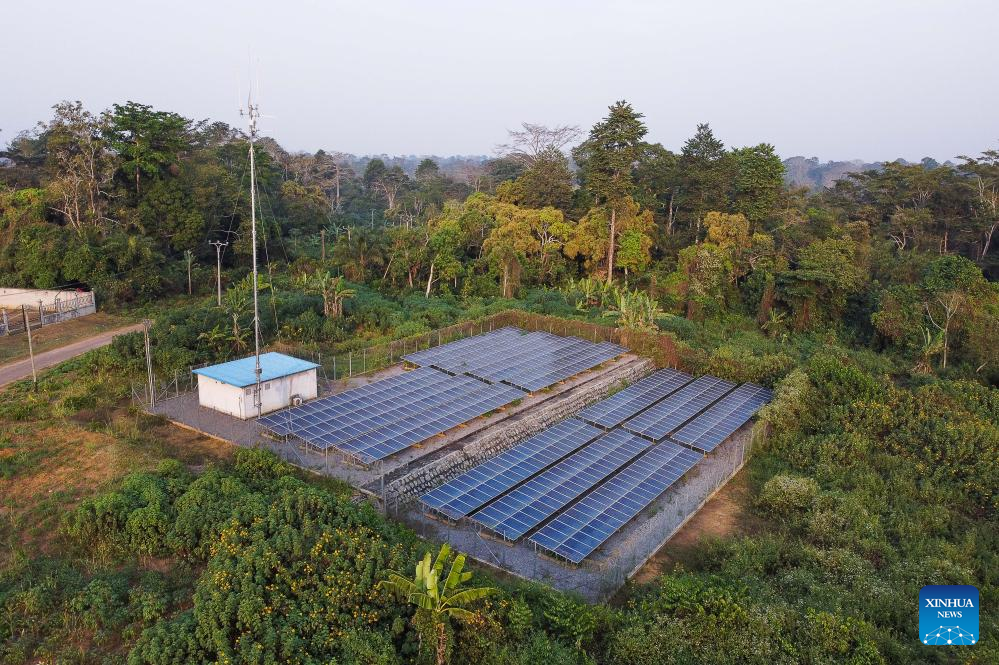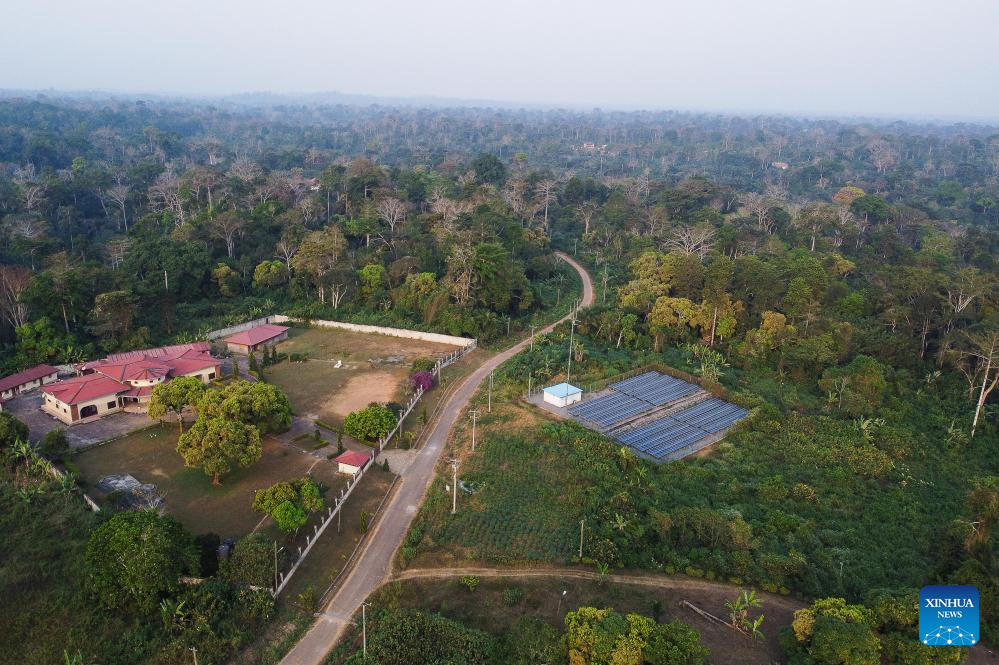
An aerial drone photo taken on Jan. 15, 2024 shows a view of the solar energy plant built by Chinese telecoms firm Huawei in Konabeng, Cameroon. (Xinhua/Kepseu)
By Arison Tamfu, Wang Ze
YAOUNDE, Jan. 19 (Xinhua) -- The cacophony of hooting, the pulsating chants of traditional songs and the blasting of plastic horns echoed across Konabeng, a village in Cameroon's Centre region.
The country's national football team had just netted an equalizer against Guinea in the Africa Cup of Nations (AFCON), currently ongoing in Cote d'Ivoire.
Dusk was falling rapidly and the match was in the second half. Villagers gathered to watch the match on a large screen. Among them was Quintin Etoundi, a respected village leader.
Eight years ago, it was not possible to follow live broadcasts of matches on TV in the village, he said.
"There was no energy, no light. We could not watch television," he said.
In many parts of rural Cameroon, especially remote ones off the national grid, access to electricity remains a luxury.
Areas covered by electrification still account for only 28 percent of the country's territory, and 80 percent of the power is concentrated in the capital Yaounde and the economic hub of Douala, according to the country's energy ministry.
About 80 percent of the country's rural population still uses wood as their primary source of energy. In 2016, the government set out to improve on rural electrification and sought the support of Chinese telecoms firm Huawei which had been on the frontline of the green energy revolution in Africa.
By the end of 2018, Huawei's Rural Star and Rural Solar projects had provided solar energy and internet to 166 Cameroonian villages of over 120,000 people in the first phase of the projects.
Konabeng was one of the beneficiary villages.
"I am very happy with the solar energy, what if there was no solar energy here? You see, I went to wear this [Cameroon football jersey] to show how happy I am," Etoundi said.
"We have never had a blackout. We are very happy. If it weren't for solar energy, we wouldn't be able to watch [the match]. So, I am happy and grateful to Huawei which provided the energy," added Hubert Atangana, who sat beside Etoundi.
In Cameroon, football is like a religion, and each time the country's team is playing away from home, the steady flow of energy is of paramount importance, said 21-year-old Rodrigue Misso Obama, who gathered with other fans to follow the match.
"Power outages are a taboo during matches. Before Huawei brought solar energy, outages were very usual. Today the solar energy has improved many things," he added.
Chinese firms have constructed two stadia in the country's west and southwest regions, which are serving football in the country.
"Those stadiums hosted very important matches when Cameroon hosted AFCON in 2022. Today, the stadiums, which are still intact, host matches of local championships. They are extremely useful to youths in particular and our country in general and we are grateful to China," football analyst James Ndukong told Xinhua.
But it seems China's most appreciated project is the broadcasting services provided by Chinese digital television operator, StarTimes.
As part of Chinese-aided project to offer services to 10,000 villages in Africa, StarTimes has helped set up satellite TV signals in several rural Cameroonian households.
"Without StarTimes, many Cameroonian villagers would not have comfortably watched AFCON in 2022. Even as the tournament is ongoing in Cote D'Ivoire, it is thanks to StarTimes that villagers here are able to follow the games. Thanks to StarTimes, villagers live football as if they are in the stadium," Ndukong added.
In Cameroon, they like to say when the national team is playing, there are only two options: either they win or they win, but the match pitting Cameroon against Guinea, in the country's first game of the tournament, ended in a 1-1 draw.
"I left the neighboring village where there is no energy to come watch the match in Konabeng. I am satisfied, despite the scoreline," said Hubert Etoundi.
"We will continue to promote the development of Rural Star and Rural Solar projects in Cameroon for the benefit of the local population," said Kong Lingyu, CEMAC sub-regional Deputy General Manager of Huawei. ■

An aerial drone photo taken on Jan. 15, 2024 shows a view of the solar energy plant built by Chinese telecoms firm Huawei in Konabeng, Cameroon. (Xinhua/Kepseu)



